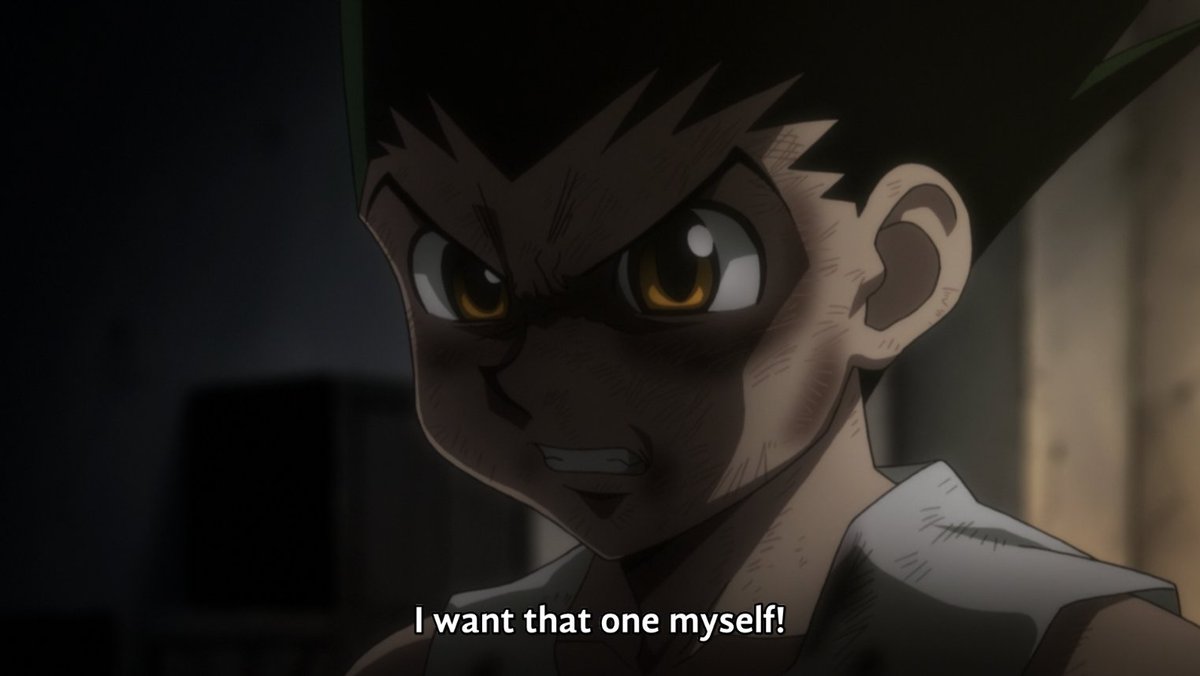
"Two sides of the same coin"
A quick study of Gon and Killua's lack of self-worth and how they foil each other.
A quick study of Gon and Killua's lack of self-worth and how they foil each other.

Killua's lack of self-worth is one of his most defining characteristics, and finding something through which he can see his own value has been his journey since he left his home, a goal which he accomplishes by the end of the story.
But what about Gon?
But what about Gon?

The thing that a lot of people can miss about Gon, is that he ALSO has low self-worth, it is just more subtle and manifests itself in different ways to Killua's. In the latter's case, he constantly reminds himself about how unworthy and incapable he is. 





But in Gon's case, and this is whenever he has a specific, short-term goal that he wants to achieve, it's like he doesn't even consider thinking about himself, both his physical and mental health are irrelevant compared to what he is currently pursuing. 







He is just like Killua, in the sense that he needs something external to define himself with, and find his value in. The difference between them is what they choose to define their value with.
In Killua's case, it started out as combat ability, which makes sense considering his origins, but slowly, as his friendship with Gon grew, that changed, now it's his bond with Gon that defines his value, or more specifically, of how much service he is to Gon and his goals. 







To the point where he idolizes Gon, placing him on a pedestal of positivity and brightness that he can't possibly match up to, and is willing to endure any amount of pain for him. After removing the needle, he slowly transitions away from this through his friendship with Ikalgo. 







However, when Gon makes it clear that he doesn't need him right now, and when the reality of who Gon is starts to clash with his idealized version of him, his progress almost crumbles. 







That's why he needs Palm to remind him of his worth again, and that regardless of what Gon says, he is still the most important person to him. And for the first time in the series, Killua cares enough about himself to demand that Gon apologize to him. 







He completes this journey by saving Alluka and becoming the light in her life that Gon was in his before, now Killua is fully independent from Gon, and their friendship is much healthier for it.
Meanwhile, Gon's journey can be said to move in the exact opposite direction.

Meanwhile, Gon's journey can be said to move in the exact opposite direction.


Gon grew up in a sheltered environment, one where the only real conflict is that between him and the nature around, and because of that he had never really encountered true failure, he doesn't have a good understanding of his own worth because he has nothing to compare it with. 



What changes everything for Gon is learning that his father had left him to live as a Hunter, and how does he react to that? He doesn't resent Ging as expected, instead, he is curious about there being something so important that Ging was willing to abandon him for. 





He is excited, because for the first time in his life, he has found something, abstract as it is, that he can measure his own worth with, so he goes out on the journey to find Ging, but it can also be said that this is a journey for him to find his own worth. 

During the early phase of the Hunter Exam, Gon encounters Hisoka, and the important thing to note here, is that it's the first time anyone has ever assigned a value to Gon, and through what does Hisoka measure that value? Combat ability. Now Gon has a metric to judge himself by. 







But then this happens. Gon, after finally getting good enough to steal Hisoka's badge and proving his worth to himself... loses, and to make matters worse, he is patronized by Hisoka and handed an unearned, shallow victory. For the first time in his life, Gon's pride is injured. 







This event is so relevant, it is the start of a cycle that we can see across the entire series from here on. Gon does not EVER want to feel that pain again, so he has to prove himself, over and over and over, it's never enough. 







Punching Hisoka in the face is quickly replaced with capturing the Phantom Troupe, then defeating Razor and forcing Genthru to use his ability, then helping Kite, and then avenging Kite.
In Gon's mind, if he can't do any of these things, then he is absolutely worthless



In Gon's mind, if he can't do any of these things, then he is absolutely worthless




Satisfying one goal isn't enough, he has to keep "moving forward", every time increasing the difficulty. In a sense, Gon has convinced himself that he is a Shounen protagonist in a world that isn't made for them, and he attached his entire value to that image. 

The irony here is that right as Killua stopped basing his value on how combat-capable he is, it became the only thing Gon could define himself with.
So just as Killua had to find his worth in himself, and not just in Gon, Gon also has to find worth in something outside of this cycle of never-ending growth. Meeting Ging, understanding that he doesn't have to do everything himself, and losing his Nen all forced him to do that. 







• • •
Missing some Tweet in this thread? You can try to
force a refresh






